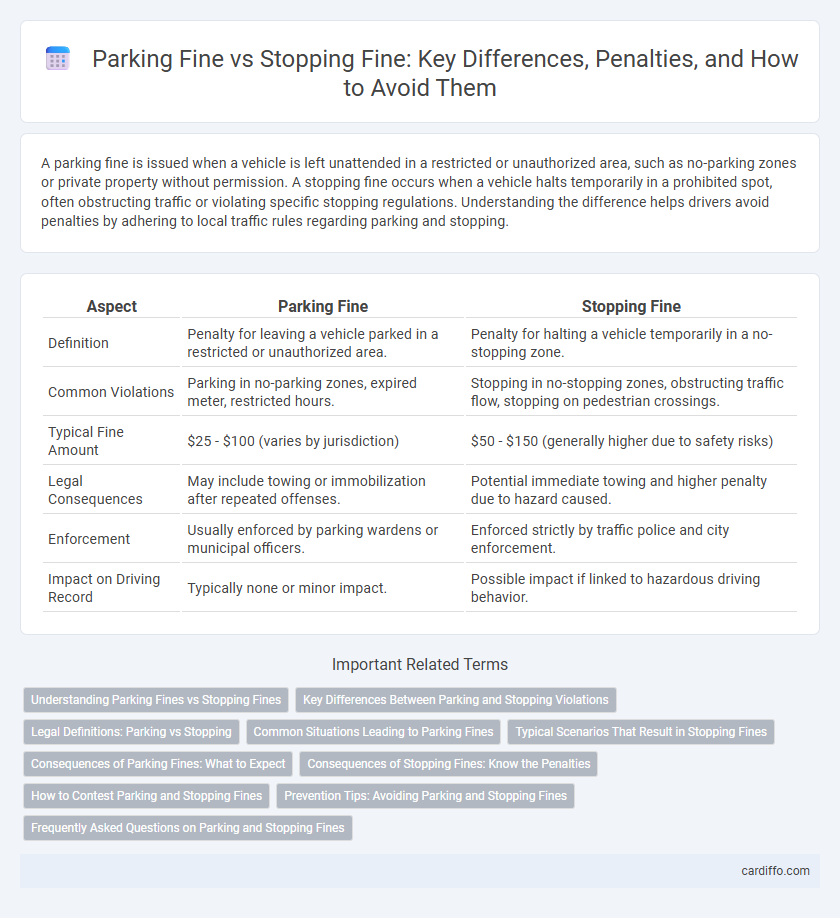A parking fine is issued when a vehicle is left unattended in a restricted or unauthorized area, such as no-parking zones or private property without permission. A stopping fine occurs when a vehicle halts temporarily in a prohibited spot, often obstructing traffic or violating specific stopping regulations. Understanding the difference helps drivers avoid penalties by adhering to local traffic rules regarding parking and stopping.
Table of Comparison
| Aspect | Parking Fine | Stopping Fine |
|---|---|---|
| Definition | Penalty for leaving a vehicle parked in a restricted or unauthorized area. | Penalty for halting a vehicle temporarily in a no-stopping zone. |
| Common Violations | Parking in no-parking zones, expired meter, restricted hours. | Stopping in no-stopping zones, obstructing traffic flow, stopping on pedestrian crossings. |
| Typical Fine Amount | $25 - $100 (varies by jurisdiction) | $50 - $150 (generally higher due to safety risks) |
| Legal Consequences | May include towing or immobilization after repeated offenses. | Potential immediate towing and higher penalty due to hazard caused. |
| Enforcement | Usually enforced by parking wardens or municipal officers. | Enforced strictly by traffic police and city enforcement. |
| Impact on Driving Record | Typically none or minor impact. | Possible impact if linked to hazardous driving behavior. |
Understanding Parking Fines vs Stopping Fines
Parking fines are issued when a vehicle is left unattended in a restricted area beyond the permitted duration, violating local parking regulations. Stopping fines occur when a vehicle halts temporarily in a no-stopping zone, often obstructing traffic or posing safety hazards. Understanding the distinctions between parking and stopping fines helps drivers comply with traffic laws and avoid penalties.
Key Differences Between Parking and Stopping Violations
Parking fines typically apply when a vehicle is left unattended in a designated no-parking zone or beyond allowed time limits, whereas stopping fines are issued for temporarily halting a vehicle in restricted areas such as bus stops or hydrants. Parking violations generally involve longer durations of vehicle immobility, while stopping violations focus on brief stops that obstruct traffic flow or create safety hazards. Enforcement of parking fines often requires evidence of prolonged stationary presence, contrasted with stopping fines that can be issued for momentary infractions.
Legal Definitions: Parking vs Stopping
Parking fines are issued when a vehicle is left stationary in a designated spot beyond the allowed time or in prohibited areas, violating specific parking regulations set by local authorities. Stopping fines apply when a driver halts a vehicle temporarily in no-stopping zones or obstructs traffic flow, even if the driver remains inside the vehicle. Legal definitions distinguish parking as leaving a vehicle unattended, whereas stopping refers to brief halts often for passenger drop-off or picking up, both governed by distinct municipal codes.
Common Situations Leading to Parking Fines
Parking fines often result from leaving a vehicle unattended in restricted zones such as no-parking areas, expired meter spots, or designated handicapped spaces without proper authorization. Stopping fines commonly occur when a driver halts in no-stopping zones, bus stops, or near fire hydrants, even if the driver stays inside the vehicle. Both fines are enforced to maintain traffic flow and ensure safety, but parking fines typically involve longer durations of vehicle immobility compared to stopping fines.
Typical Scenarios That Result in Stopping Fines
Stopping fines commonly occur in scenarios such as halting in no-stopping zones, blocking pedestrian crosswalks, or stopping within an intersection. These fines target brief vehicle halts that disrupt traffic flow or endanger safety, distinguishing them from parking fines, which apply to longer-term stationary vehicles. Enforcement often uses CCTV and traffic officers to identify unlawful stops that pose immediate hazards.
Consequences of Parking Fines: What to Expect
Parking fines usually result in a monetary penalty that increases if unpaid beyond a specified period, potentially leading to additional late fees or vehicle immobilization. Repeated parking violations can escalate consequences, including towing or license suspension in some jurisdictions. Understanding local regulations is crucial, as unresolved fines may affect credit scores or vehicle registration status.
Consequences of Stopping Fines: Know the Penalties
Stopping fines often result in immediate penalties such as hefty monetary fines and points on the driver's license, which can lead to increased insurance premiums. In some jurisdictions, repeated stopping violations may trigger vehicle immobilization or towing, adding additional costs and inconvenience. Understanding local regulations is crucial to avoid severe consequences that affect both finances and driving privileges.
How to Contest Parking and Stopping Fines
Contesting parking and stopping fines involves gathering evidence such as photographs, witness statements, and relevant traffic regulations to support your case. Filing a formal appeal with the issuing authority or local traffic court requires adherence to deadlines and proper documentation, often including a written explanation of why the fine is unjustified. Understanding distinctions between parking violations (like overstaying a designated spot) and stopping infringements (such as stopping in no-stop zones) helps tailor your defense effectively.
Prevention Tips: Avoiding Parking and Stopping Fines
To prevent parking and stopping fines, always observe local signage and road markings indicating restrictions and permitted durations. Use designated parking areas and avoid stopping in no-parking zones, near fire hydrants, or bus stops. Regularly update your knowledge of municipal parking regulations and utilize parking apps for real-time monitoring and payment.
Frequently Asked Questions on Parking and Stopping Fines
Parking fines are issued when a vehicle is left unattended in a restricted area or exceeds the allowed parking duration, while stopping fines apply when a vehicle halts temporarily but violates no-stopping zones or obstructs traffic flow. Frequently asked questions include how to contest a parking or stopping fine, the difference between illegal parking and illegal stopping, and the penalties associated with each violation. Understanding local traffic regulations and the specifics of signage helps clarify when a fine is likely to be issued, aiming to prevent confusion between parking and stopping offenses.
Parking fine vs Stopping fine Infographic

 cardiffo.com
cardiffo.com